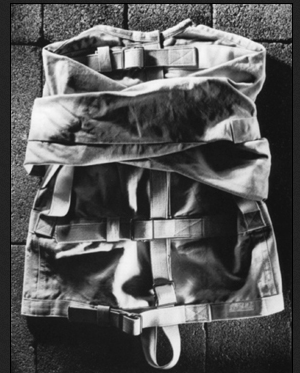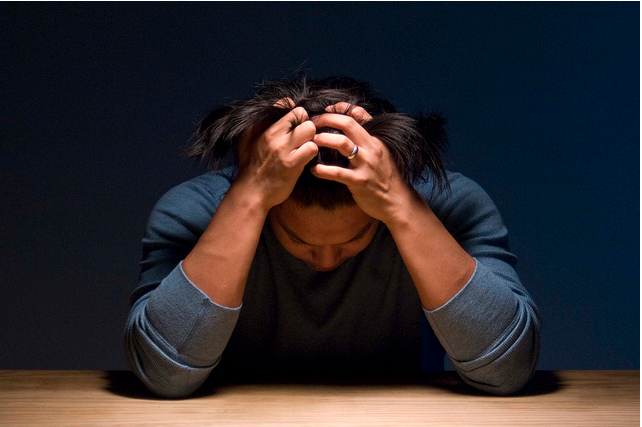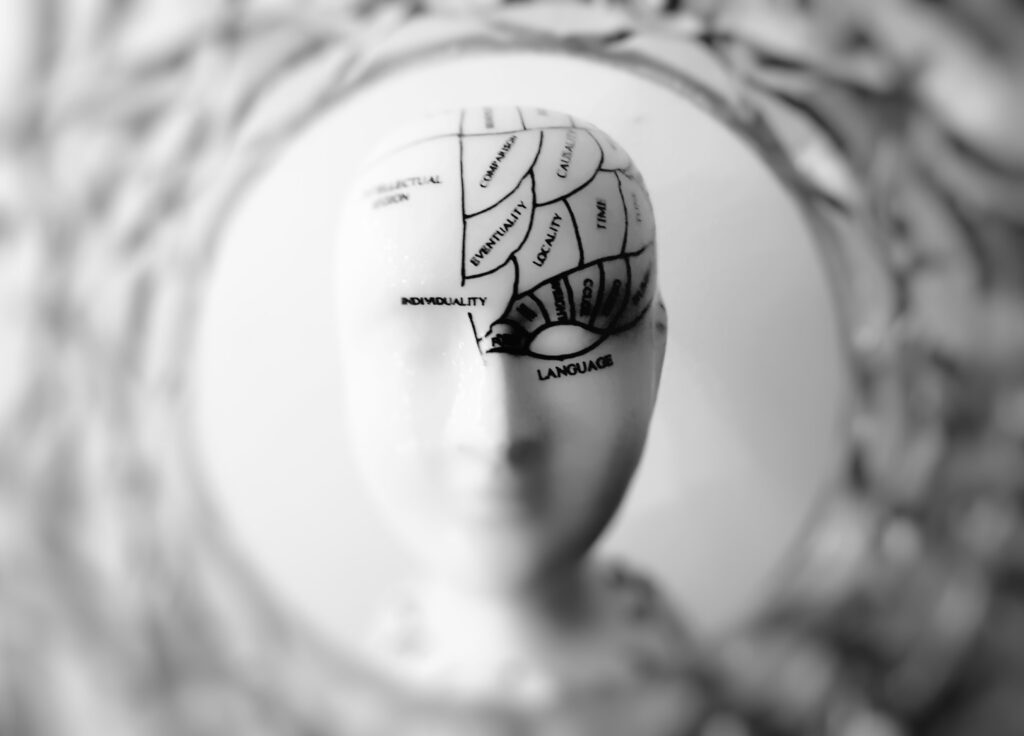
Last time, we talked about Impostor Syndrome, how many of us struggle with feeling like a fraud. This often dovetails into a nasty cycle of over-achieving as a coping mechanism to shield us from feelings, failure, pain, etc. But, like many coping mechanisms, they can be great for the short-term but a living hell if we allow them to become a habit.
Habits can be particularly insidious because its behavior so ingrained it’s subconscious. Add on top of this a world that keeps pushing us to go faster, do more, be more. This adds fuel to the proverbial fire.
Our modern world trains us to never hit the ‘OFF’ switch because there’s money to be made if we’re constantly plugged into the Matrix.
Perhaps we work at a computer all day. How do we take a break? We hop on-line, dive into social media, watch Netflix or play on-line games. We’re never taking time to ‘get out of our own head’ which is often why we lose touch with our emotions.
As a consequence, our capacity to ‘feel’ atrophies.
The data’s already piling up. Technology is wreaking havoc on our emotional, psychological and physical health. As technology becomes more ingrained in our everyday world, part of culture, we’re wise to pay attention. Technology is increasing codependency, anxiety, and depression, while also wrecking memory, social skills, and our ability to empathize.
Our Western culture already had an unhealthy relationship with emotions, and it seems technology is making this worse. We’re addicted to distraction.
Socially Acceptable Emotions

As humans, we’re naturally imbued with a vast pallet of emotions. No emotion is inherently good or bad but all are necessary and serve a purpose.
When we repress one emotion, it’s like plugging a geyser. That will only work so long until there is an eruption of some sort. For instance, if we believe we don’t deserve joy and shuffle past this emotion to go onto the ‘next’ achievement, it can eventually manifest as grief.
Why?
Playing armchair shrink, we’re grieving the moments of joy that have come and gone that we failed to grab hold of. We lose sense of purpose because if there is no joy, no sense of I DID IT! Why are we even bothering?
There’s this odd social dogma that being happy is good, and, that if we aren’t happy something is wrong with us. Anger, sadness, disappointment, disillusionment, rage, fear, etc. are ‘bad.’ If we can’t be any of these, then busy works just fine and comes with lots of kudos.
When someone is sad, angry, upset, it makes us uncomfortable. We switch into trying to make the person ‘feel better.’ But is this always the best course of action? It is (perhaps) for us, because ‘bad’ emotions make us uncomfortable. Additionally, since we’ve been reared unprepared for these emotions within ourselves, how can we help anyone else?
Grief and Loss

On the last post, I mentioned I’d recently come unstitched because I use work and achievement and being responsible to numb out. Yet, if we study human history, we’ve gotten away from many of the traditions and practices which used to accommodate the ‘bad’ emotions.
For instance, let’s dial back a century and look at death and loss. I recently listened to an excellent Southern Gothic, Black Water by Michael McDowell (the unabridged saga). In the book, when there’s a death, those impacted hung black wreaths on their doors. They also hung black wreaths on the front of the cars. Women wore black and men wore black arm bands.
Grief and loss possessed a physical outward expression, a bold honesty to the world claiming pain. Oh and wonders of wonders! This was OKAY.
The community respected, honored and nurtured those hurting. There used to be a mandatory time period for grieving.
Yet, how many of you have lost a loved one and work wanted to know if you’d be back within the week? How many of you have experienced a loss and YOU expected YOU to be back at work within the week?
Modern World & Loss

I spent most of my growing up years with my grandparents, meaning my grandmother served also as a mother. I lost my grandmother July 4th two years ago. Problem was she died when July 4th happened on a Monday. No long weekend to get over that one.
Also, since her death was ‘only’ one in a long series of losses, I didn’t mention it a lot. I’d already ‘burdened others’ with four deaths in the previous year. Don’t want to be too needy. Then, after she passed, I lost four more loved ones in the next six months.
To be clear, no we weren’t hit by bad luck or plague. I was extremely blessed with a large family I loved very much, who lived VERY long lives. This meant these great aunts and uncles and grandparents had been a fixture in my world since I could remember. Problem was they were all hitting their 80s and 90s at about the same time…meaning I was losing them at about the same time.
Yet, what complicated my grieving (or lack thereof) was that even if I’d lost ONE person, our culture rushes past death.
To be blunt, our culture rushes past loss in general. Breakups, divorces, job loss, kids going off to college, getting dumped, losing a business, etc. are all ‘deaths.’
Yet, how often are we encouraged to ‘forget about it,’ ‘move on,’ ‘get back on the horse that threw ya,’ and so forth? Worse, how often do we encourage others the same way? *cringes* Our kids cry because they lost a game, fought with a friend, or broke a toy, and immediately we comfort…and distract them. Again, guilty as charged.
Why can’t someone feel sad? Maybe WE can feel sad. Calm down. Baby steps.
How Does It FEEL?

Experiences, good and bad, are meant to be FELT. Yet, how often are we thinking when we should be FEELING? Part of me is sad that there are not a lot of pictures of my growing up years.
Cameras, film, processing film cost money. Most regular people couldn’t afford home movie cameras to ‘document’ the birthday, graduation, birth, baby’s first steps, etc.
Yet, I’m also happy about this. The handful of old pictures evoke far more emotion than the 1700 images on my current iPhone. Why? Because BACK THEN, I was fully present in the vacation, party, family reunion, etc. I was free to feel.
I watch those around me (and I’m guilty, too) so busy taking pictures (to post on Facebook, Instagram, SnapChat, or to ‘remember’) they’re actually not present in the PRESENT. Left brain (analytical) is so busy documenting the joy, we’re not slowing down to FEEL the joy because right brain is told to wait.
It was tough for me when I visited New Zealand last year. I wanted to take pictures of everything! Film ALL THE THINGS so I could REMEMBER!
I had to chastise myself to stop, put down the iPhone and BE PRESENT. Experience the majesty, the elation, the beauty and FEEL them all.
Imprint the moments in my bones and my mind. Viewing mountains through a small screen was a shill for stopping to simply enjoy the view.
We’ve turned into a world of documentary-makers. Yet oddly, what good is the film or picture to recall a moment where we failed to be fully present?
If we’re not experiencing emotions during the graduation or the wedding, then what is that short video truly going to bring back? What will we feel?
Paralysis of Analysis

If we’re numbing and avoiding grief and emotionally absent from joy, this has a cumulative effect. Over time, we drift away from what makes us human (our feelings). When we are hurt or angry or sad, we analyze it away.
Google a blog about how to handle being dumped. Enjoying a good time? Grab the phones and DOCUMENT.
It’s fair to say most of the population over thirty is growing increasingly concerned with how much people are staring at their phones all the time.
We see families at dinner in a restaurant talking to people on-line, ignoring the ones across the table. Couples on vacation busy taking pictures of ‘moments’ instead of making real moments.
I’m old enough to remember when beauty parlors (salons) were hives of talk, chatter, gossip and laughter. Now, when I go get my hair done the women all sit staring at tablets and phones, checking email and Facebook.
I’ve made it a point to interrupt them, especially the young ones.
One time, I interrupted a young 20-Something on her phone to talk. I asked her about what she was doing, why she was there to get her hair highlighted…and she gaped at me like a deer caught in headlights. Smiling, I said, ‘Facebook will be there in an hour. Promise. But I won’t be. Tell me where you’re going to college?’
Initially she seemed on the verge of apoplexy, but over time was smiling and telling me about how she was going off to UT Austin and was hoping to go to law school. Within minutes, she was laughing and excited and had forgotten all about her phone.
Put the Phone DOWN

This seems like strange advice from a social media expert, but it’s actually okay to put the phone away and to not document every moment for posterity 😉 . That image posted on Facebook will be gone in a couple days. Yet, make an authentic memory and that’s there for life.
When my nephew graduated and everyone had phones aloft, I simply watched, listened, and enjoyed. Let myself feel. I guarantee that memory will be far more visceral, hold exponentially more emotional weight than the times I was ‘busy’ taking pictures of every minute. I was too distracted to take in the smells, sounds, textures, and feelings.
We only have so much time, and we have a choice. Reality or virtual reality? I believe the more willing we are to be present, the more comfortable we’ll become with our emotions. If more of us do this, the more comfortable we’ll grow with other people’s emotions.
Let Them Cry

Ever hear that advice for babies? Crying is good for us. We need to let ourselves CRY. Crying releases stress hormones and increases the feel-good hormones. Besides, the emotion will be there in one form or another. If we fail to feel it real-time and at full strength, we hammer it flat.
Flattened emotions take up more metaphorical surface area. Thus, instead of gut-wrenching grief that lasts only a month or six months, we might be left with dull, aching depression spanning years.
If we don’t dive into joy so intense we feel we might burst, we could be left with saccharin memories (artificially sweet and not quite ‘the real thing’).
As writers, being emotionally attuned is critical for superlative writing. Empathy is our greatest tool, but empathy demands we’ve experienced an emotion. If we keep numbing, avoiding, documenting, and checking out, it shows in the writing. We end up with talking heads, plot puppets and ‘bad situations’ instead of drama.
We remember great stories for one reason and one reason only: How they made us FEEL. Want to be a great writer? Less thinking, more feeling 😉 . Pay attention to feelings (ALL of them) because it will make you healthier as a person and stronger as a writer.
In the End
Moderation is key. I love social media, blogging, chatting with people all over the world. Yet just because the world doesn’t have boundaries doesn’t mean boundaries aren’t a good idea.
My goal with this post is to challenge us to FEEL, because what makes us humans and not robots is we FEEL. We feel happy, sad, elated, crushed, proud, jealous and we NEED to feel those emotions and MORE.
I, too, am a work in progress. But, I believe if I work on slowing down, learning to feel the good and bad and ugly I will get better at it. Like all things, practice makes perfect. Setting down my iPhone for more of the iFeel 😉 .
What Are Your Thoughts? (Then Feel FREE to Go OffLine!)
Do you seem to struggle more in our modern age with being able to feel? When a negative experience hits, are you (like me) quick to go look up a blog, binge-watch HBO, or scroll Facebook? Are you afraid to feel? Unused to being able to feel? Have you turned into a mini-documentary maker, too?
Have you become addicted to distraction? Are there childhood memories that are SO REAL (even decades later) because you didn’t have any technology to interrupt? So you remember the smell of the grass and Coppertone, the feel of the sand, the bite of saltwater up your nose when you first dove into the ocean…
If you do? SHARE! I’d LOVE to hear about these authentic moments!
I love hearing from you!
What do you WIN? For the month of JUNE, for everyone who leaves a comment, I will put your name in a hat. If you comment and link back to my blog on your blog, you get your name in the hat twice. What do you win? The unvarnished truth from yours truly. I will pick a winner once a month and it will be a critique of the first 20 pages of your novel, or your query letter, or your synopsis (5 pages or less).








27 comments
5 pings
Skip to comment form
Oh, Kristen, you’ve done it again. Hit that touchstone, that raw spot, that place I didn’t know needed to be exposed. Brilliant. And yes, I’m crying a little. Lots of grief here I haven’t allowed myself to process. And as a writer, emotions are our stock in trade. Thanks for this! <3
Yup, absolutely terrified. Bury myself on phone games, computer games, work, cleaning, ect. I’m primed for a mental breakdown. Dunno how soon but it’s inevitable.
Thank you for your refreshing take on life. I do enjoy your writing. It’s the small topics that matter. You surely know how to tackle them through your amusing posts.
What a great post, Kristen — a nice change of pace from your (excellent) examinations of business and craft. I second everything you’ve said here about social media — as an Xer, I’m increasingly alarmed by the stooped posture everyone under thirty seems to be developing from leaning into their iPhones day and night — and I completely agree that “negative” emotions aren’t bad emotions. Feeling bad is at least feeling something, and we should openly embrace it, and try to understand what our subconscious is telling us.
I recently wrote about my own first bout with disillusionment, at age fourteen, and how a movie I saw at the time — an obscure Sean Penn/Gary Oldman drama called State of Grace — helped me cope with what I was feeling not by assuring me that things were going to be okay, but by teaching me that disillusionment is one of life’s recurring motifs, so I’d better not let it knock me down for too long. Storytellers in particular need to be in touch with the spectrum of emotions so they can meaningfully orient the rest of us through life’s ups and downs.
This reminds of the Pixar movie Inside Out. The movie really shows how the only “okay” emotion is happiness, and what happens when we suddenly aren’t “happy” anymore.
Not sure when grieving stopped being okay. When feeling anything but happiness was frowned upon. I’m going to blame the Victorians. Just because.
As for the phone thing, I totally hear you. I can’t tell you the number of times I’ve wanted to scream “put down your phones, you’re missing something really good!”
I can be guilty of it, too, but then I don’t much care for social media. I didn’t open a Facebook account until I decided I wanted to make a go of writing. Still not sure I shouldn’t shut it down. I don’t enjoy it, but something pulls me back to check.
Life is so short, but I swear they hired addiction experts to create Facebook, Twitter, Instagram and the like.
The week I was on vacation and turned it all off was bliss. I need more of that.
It’s not the Victorians’ fault! If anything, they went OTT the other way. (Proxy mourning by second wife if parent of deceased first wife dies? OTT.) I think it was the First World War that killed the mourning culture – every family was mourning, pretty much, so you just had to pull yourself together and get on with it.
Thanks for this thoughtful post, Kristen. I am over 30, but still I find myself addicted to distraction. So now I’m going to step away from the screen and go make a mustard sauce for my dinner.
Thoughtful, thinking post, Kristen — thanks…
I have two personal theories as my ‘comment’:
1. Humankind ‘evolved’ from hunter/gatherer to farmer/herder to mutant hunter/herder to further mutated hunter/gatherer. Our original instincts remained the same, we just mutated via our objectives. Many other related points, but won’t bore anyone with that.
2. We cry due to loss — period. There are apparently unlimited sub-sets of tear triggers, but they all signify some type of loss. That state of loss creates vulnerability and then fear, until our state of flux is stabilized by acceptance or actions.
I love that you are treading in areas rarely addressed, or not deeply discussed, that seem to particularly affect writers, being a group of sensitive, artistic folks who often tend toward hermit-itis…
Thank you for creating a space where every visitor, even the eternal lurkers, can find thoughtful, intelligent questions — and answers.
Food for thought – make mine a BLT, hold the mayo…
Twice this year, when unexpected, unpleasant events interrupted my normal writing schedule and social life, the prospect of maintaining an upbeat, on-top-of-things persona on social media was exhausting. I allowed myself to drop out and tune in to what I really needed in order for some healing to happen. As you’ve written, less thinking, more feeling is what makes characters alive in the minds of readers. It’s also what makes all of us more fully human. Thank you for the reminder.
You’re amazing. THIS is amazing. Thank you, thank you, thank you!
Love love love this!!! And so true! I just turned 50 this week and I feel so lucky to have grown up without the constant connection to technology, social media and all the additional stress that comes with it.
Thank you for another great post.
Another excellent post that definitely gets me thinking. When I was a kid, my well meaning parents kept trying to “fix” me with counselors, therapy, etc. No one ever told me that it was okay to feel bad once in a while. The blues became something that must be eradicated immediately, so one day couldn’t pass where I wasn’t supposed to be cheery and “normal.” For me, those two words don’t even go together and it took decades to accept that and not be ashamed of being who I am. I spent my life trying to fix something that wasn’t broken. I’m still a work in progress and posts like this let me know I’m not the only one.
I do my best to walk 30 minutes every day to refresh, look at flower, find bunnies, the good stuff! But when the air quality is in the red zone for over a week (like it has been)–I veg on Netflix. Those are the hard days ’cause I can tell I’m not really de-stressing.
As always, an interesting read. Much of the past 15 years has been spent with teaching my son appropriate ways to manage emotions. (He is diagnosed with high-functioning autism.) Now that he’s a teenager and emerging from his shell, his emotions are more intense than most. I want him to understand that these feelings are ok and natural, but can be channeled to his music and art. As much as I fret about his socialization, I’ve discovered that his generation tends to be emotionally stunted (I had cleverer words, but those are gone). Technology has seeped into every facet of teens’ lives, from having it as as a de facto babysitter, to vying for social media recognition.
Oh Yes!
Dearest Kristen, when I started reading your blog lo, these many years ago, you were saying the same thing, i.e, how you kept yourself so busy that you couldn’t feel the pain of loss or, conversely, the joy of success. I mention this because I’m sure you’ve come a long way since then and I hope you can feel proud of yourself for the accomplishment. (And? I need you to be stable enough to help me while I struggle with my WIP.? No pressure, though. ?)
Author
I am not where I want to be but certainly not where I used to be. Progress not perfection. My problem isn’t so much being stable, rather being ALWAYS stable. Growing more comfortable with having bad days or simply crying when I feel hurt. I do struggle feeling ‘proud’ but working on it. You guys’ taking time out of your day to comment so thoughtfully REALLY helps. My Inner Critic certainly isn’t going to encourage me or tell me I did something worthwhile, so the feedback is always welcome, even when it’s something critiquing a piece (or debating a point I’ve made).
I don’t necessarily always need flowers and sunshine (though that rocks), but often you guys will add in extra thoughts, angles I hadn’t pondered or ways to explore in a different or better way. It’s why I add in the questions at the end. I can only know so much, can only draw from MY experiences and background which is limited. It never ceases to amaze me how much WISDOM y’all share and how that has helped me grow TREMENDOUSLY.
I definitely notice this blocking out with technology syndrome in the 20-somethings I work with. One walks in with buds in his ears. You can say good morning to him but he won’t hear you or acknowledge. Every break, every time he steps in the back room, every bit of down time, the phone is out. I’ve tried having a conversation with him, but it isn’t easy. He “hates people” and is perpetually angry. So sad. And couples in restaurants sit across from each other and never make eye contact or converse b/c they’re glued to their devices. Heartbreaking.
Hi Kristen, thank you for this – again. I am trying to take it to heart and feel more. How can we share this post with others who do not yet follow you?
Author
Copy the link into a text message or email 🙂 . Thanks!
Thanks for this thoughtful post on Phone and Many other related points. You’re amazing.
Kristen, this is such an awesome post and so needed in today’s world. I’m worried about my kids and how technology is going to affect their lives and their relationships. I try to make sure they’re social without the technology but sometimes it’s hard to compete with it.
I just got back from a weeklong camping vacation where I deliberately left my laptop, my tablet, and my smartphone at home. The funny thing was, I did not miss the internet one bit while I was gone. I spent time with my kids, reconnected with my husband, enjoyed nature, read seven books, and brushed up on my old “boondocking” survival skills that haven’t seen use since before the three youngest kids were born.
The thing about not having “off” time on a regular basis is it makes “voices” go silent after a while. I’ve been suffering from burnout and a serious case of writer’s block for the past two years, getting precious little writing done given the amount of time I spend at the computer. By the end of the week, the little “glimmers” were beginning to come back … not completely … but I can see how the lack of “unplugged” time is probably the source of the burnout. From now on, I’m going to be seriously limiting my online time.
Oddly, my grandkids seem to have active social lives, even with the ever present phones. But I know what you mean.its easy to get sucked into viewing an event through a camera lens and so missing the sheer joy of being there. Social media is great,but doesn’t replace actual relationships and communication. I have a photo of a family gathering and everyone in it is engrossed in their phone except my late husband, who looks as left out as he must have felt. It makes me sad even years later.
You’ve hit a thousand nails on the head with this post (not to be too cliche’). The numbing of individuals is eroding our values and culture. Who, better than authors, should lead the charge to recapture the social interactions, sensory impressions, authentic experiences from times before our collective obsession with computers? Thanks for this thoughtful and sincere post.
Wow, you are so right. I see myself in this article, and the pain I am in, over and over because other people don’t want to be around people that are struggling.
I definitely agree with you that many focus more on “documenting their vacation” than on actually enjoying it. There are definitely times where I don’t feel like taking pictures, and there have been times where I enjoyed taking them, but felt no desire to post them anywhere, and I think there’s something to be said for, as you say, not letting habits become “obligations”. A person may regularly attend trivia night, but even if they have nothing better to do, they always have the choice to just “not go”.
What’s more challenging for me is negative emotions. Sometimes I do need to express negative emotions, but there’s a fine line between “expressing” and “wallowing”. Sometimes I need to be angry, or sad, but I also need to “let go of it” rather than cling to it.
I think a lot of it is the need for validation, the need to feel that it’s okay to be angry/sad, and that it’s not “a mistake” to feel it as intensely as I do.
I will admit, sometimes it does help for someone to “distract me” with something upbeat, and it feels good, like a nice emotional “salve” to numb the pain, but sometimes, yeah, it just needs to be felt.
As with a lot of things, I think people have a bad habit of getting into habits, of wanting the same answer to apply to every situation where a certain emotion or problem is present. But, at the end of the day, we are not machines, and emotions are not a science, in my opinion.
Thank you for this wonderful piece. Everything is so true and realistic. I’m glad that I was able to disconnect myself from social media which I find very stressful.
[…] via Learning to FEEL: Put Down the iPhone & Embrace the iFeel — Kristen Lamb […]
[…] Weiland advises judge yourself less, trust yourself more, and write better. Kristen Lamb encourages learning to feel: put down the iPhone and embrace the iFeel, and Daphne Gray-Grant tells us how writers can become better at […]
[…] us to do better, to be better. Not only as writers but as people. In a recent post about the dangers of constantly being connected to the Internet and busy on one device or another, she wrote about the […]
[…] how many times I need to just take my own advice. A while back I wrote a post about embracing all our feelings and giving ourselves permission to grieve. To be completely transparent, this year has had me […]
[…] to confess to your kid that you don’t know how to cry. Harder still to explain something you, yourself don’t even understand. I told him I grew up […]